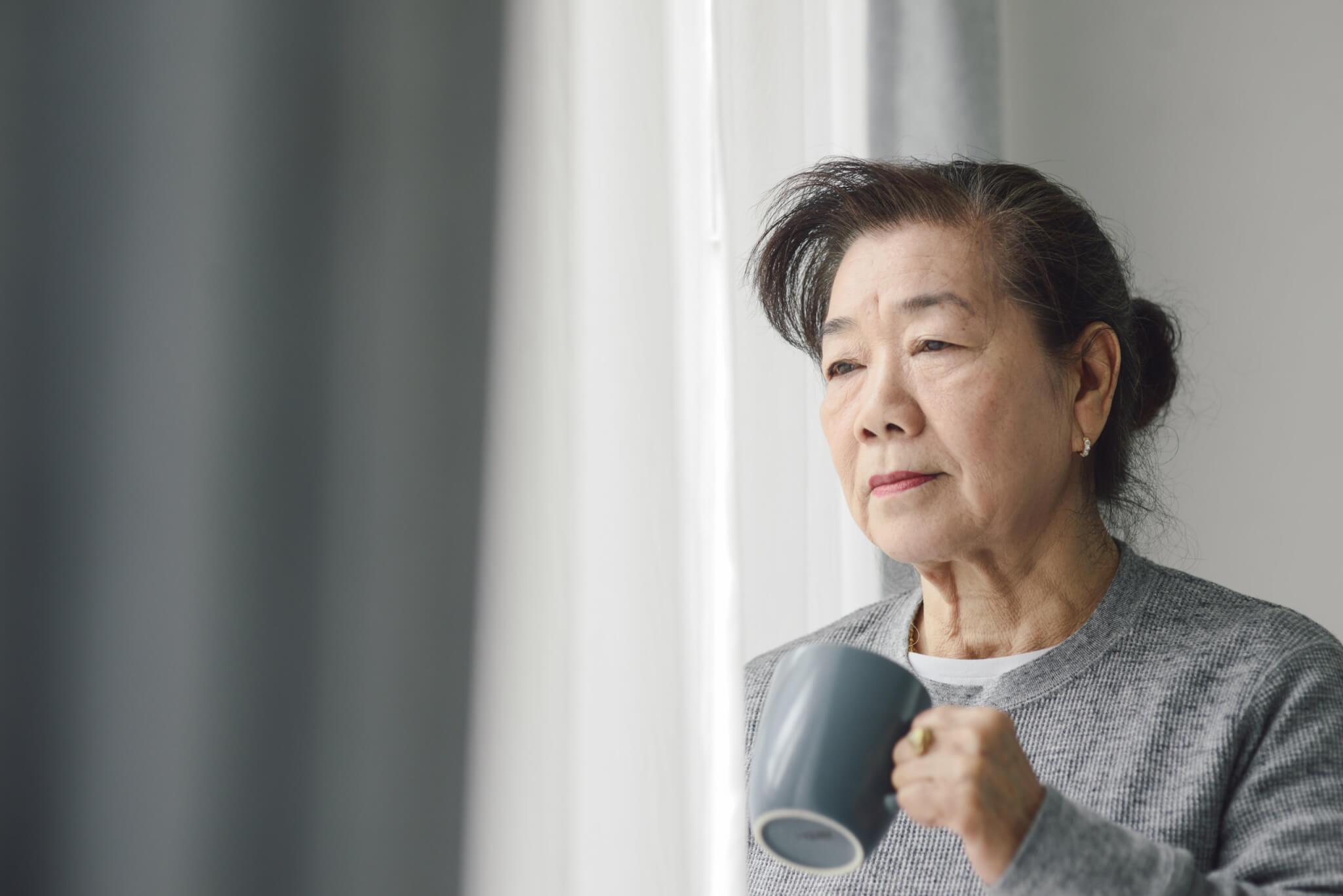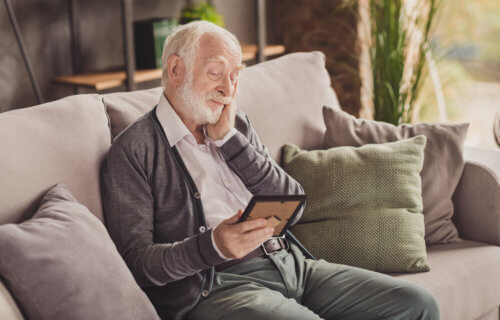💡What To Know:
- 53% of older adults have reported to a doctor that they feel lonely.
- Loneliness was a bigger stressor than alcoholism, smoking, and obesity.
- Studies show the COVID pandemic exacerbated the growing trend of loneliness.
INDIANAPOLIS — Loneliness may be the worst thing for the health of older adults. Researchers from the Regenstrief Institute and Indiana University School of Medicine found that loneliness, which has emerged as a major biopsychosocial stressor, is worse for older people than alcoholism, obesity, and smoking up to 15 cigarettes a day.
This study, published in the Journal of the American Geriatrics Society, suggests that primary care clinicians could be at the forefront of addressing this silent epidemic. The findings, which come in the wake of the U.S. Surgeon General’s call to action to address the loneliness epidemic, highlight that 53 percent of older adults visiting primary care facilities report feeling lonely. These feelings significantly impact their physical and mental health, reducing their overall quality of life.
“The first and obvious answer for loneliness is for primary care physicians to screen their patients,” says study first author Dr. Monica Williams-Farrelly, a Regenstrief research scientist and an assistant research professor at IU School of Medicine, in a media release. “Based on the literature and research, loneliness has influences on health that are quite significant and quite strong, so in the same way that we ask older adults: Do you smoke? Or do you measure your blood sugar?”
The research underscores the importance of primary care settings in not just identifying loneliness but also in offering tangible solutions.
“This research is important because it identifies and suggests evidence for interventions that are necessary for older adults in primary care who experience loneliness,” explains principal investigator Dr. Nicole Fowler, a Regenstrief research scientist and an associate professor and a director of research at IU School of Medicine. “Primary care clinicians should discuss loneliness with their older adult patients and provide resources to help them create meaningful social relationships.”

One particularly effective intervention highlighted by researchers is the Circle of Friends concept. This three-month, group-based psychosocial rehabilitation model focuses on enhancing interaction and friendships among participants. It has demonstrated success in not only reducing feelings of loneliness but also in improving various health outcomes, such as subjective health, cognition, and mortality, while potentially lowering healthcare costs.
The study’s data was gathered during the COVID-19 pandemic, which amplified the already increasing trend of loneliness among older adults.
“Loneliness may seem simple, but it can be complex to identify and address. It started to become a problem before COVID-19, and then with the national stay-at-home order caused by the pandemic, social contact was being prevented, which exacerbated the problem,” notes Dr. Williams-Farrelly.
Data for the study was collected from the Caregiver Outcomes of Alzheimer’s Disease Screening (COADS) clinical trial, indicating a pressing need for interventions targeting loneliness prior to and continuing beyond the global health crisis.
This study not only sheds light on the profound implications of loneliness on the health and well-being of older adults but also emphasizes the critical role primary care practitioners can play in mitigating this issue. By incorporating loneliness screening into routine care and providing resources and referrals, healthcare providers can significantly impact the lives of those suffering in silence.
StudyFinds’ Matt Higgins contributed to this report.

Trust is never mentioned in any of the articles addressing lonelines. People are getting betrayed left and right by predatory people and this causes them to naturally withdraw.
Certainly an issue. It is one that several institutions could alleviate if they could take the time to question a person known to live alone. Example: bank, Investment broker, hairdresser, manicurist/pedicurist, pharmacy, etc.
I think this is another example of correlation not causation. As you get older or unhealthier, the less you are able to be social.
The problem with this website is its boast of serving up “Research, in a nutshell”. It seems it runs with a press release and seemingly doesn’t do a deep dive into a quoted summary.
This study is a clear example of that. There was nothing in the study to suggest that loneliness is a greater threat to health than alcohol, obesity, or smoking a half pack of cigarettes a day.
From the results of the study: (Edited to eliminate “scientific jargon”)
“Spearman correlation analyses revealed that loneliness was moderately correlated with mental health QOL , anxiety severity and depression severity, while weakly correlated with physical health. After conducting unadjusted and adjusted linear regression models, we found that loneliness was significantly associated with both lower mental and physical QOL.”
That’s it. Where is the suggestion it’s a more serious problem than alcohol or smoking?
I find that publishing that it is to be reckless. Loneliness is a challenging problem for anyone. Suggesting it is an even greater problem than those behaviors is unjustifiable.
Also people die around you and your social network shrinks as part of the natural lifecycle.
One cannot order up meaningful relationships from the Doctor.
It’s hard to just go get social…
It may be best to stay engaged in any lifelong relationships and cultivate them.
After losing my spouse of nearly 40 years to a terribly unjust, and undeserved, illness right before the pandemic – I felt like I was living on the other side of the moon in widowed isolation. At first, it felt like punishment from God Almighty.
It has been four years now and I have come to embrace my solitude. Being alone allowed me to work on grief, anger, confusion, etc.
In the interim I observed what I once thought was a relatively sane world descend into madness on a Biblical scale.
I sought refuge in nature, walking daily away from the maddened crowd. I limited my screen time, including TV, cellphone, internet and all devices as I drank in the splendor of God’s creation.
I also came to realize that my grief will never fully resolve or disappear – nor should it, it followed a lifetime of shared love. Death does not end love, it transforms it.
Uh… No . I just WANT to Be Left Alone . Solitude Rules . People are nothing but Trouble . I Dont live in a log home in a high mountain hollow 2 miles from pavement cause I wanna see people .
if its pity yer giving then I’ll have me None .
If its Warmth yer expecting Go Out In The Sun ! !
….I think I’m in love…….
While I don’t deny that there are people for whom simple loneliness could be the equivalent of a pack a day of tars and pesticides, I think the proponents of studies like these are over-simplifying the state of being alone as an excuse for more nanny-statism.
Speaking as one who suffers from aloneness (the acute realization that you are surrounded by people that either assume your core values do not exist,or believe they must alter you to destroy the essence of who you are)
Also people die around you and your social network shrinks as part of the natural lifecycle.
One cannot order up meaningful relationships from the Doctor.
It’s hard to just go get social…
It may be best to stay engaged in any lifelong relationships and cultivate them.
Given I’m a world class, consummate loner, I think I’ll head to buy a carton of Camels and a handle of Old Granddad. Party hearty, y’all.
Perhaps you can put off the grim reaper by being smoked and pickeled.
Alcohol, cigarettes and ice cream, cure to loneliness.
My fear of living alone is overridden by my fear of having to live with someone.
For those who scoff, loneliness is real. With thirteen close family members living close by only one is ever in contact. Yes, they live busy lives, but not 24/7 and a text takes no time at all. In their eyes are we so useless it’s alright to ignore us?